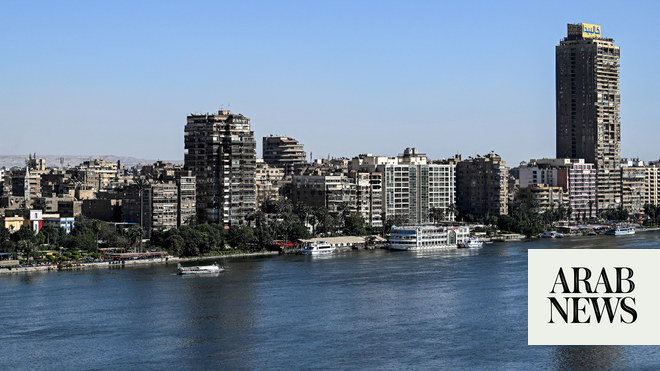
As dusk fell over the verdant grounds of the Marriott Mena House hotel, the reflection of the Great Pyramid of Giza grew darker in a pool built to reflect the last of the seven wonders of the world.
A band played a smooth jazz rendition of the Eagles’ Hotel California on the grassy lawns as guests assembled for dinner, while the staff attempted to project a sense of business as usual, despite the hotel’s recent acquisition by an infamous Egyptian real estate tycoon, Hisham Talaat Moustafa, and two powerful Emirati conglomerates.
The sale of Mena House and six other historic hotels – financed by the Emirates – is part of what Timothy E Kaldas, an analyst of Egypt’s struggling and often opaque economy, termed “an underwhelming fire sale” of state assets, as the government clamours for cash injections while diving deeper into debt.
Moustafa is Egypt’s largest real estate developer, whose business empire has witnessed a rebirth since his release from prison in 2017, after President Abdel Fatah al-Sisi pardoned him of a murder conviction. His portfolio includes properties across Egypt’s new capital, the crown jewel of Sisi’s megaprojects, in addition to his hospitality arm, Icon, which owns several luxury hotels in Cairo.
His Talaat Moustafa Group (TMG) has now acquired seven heritage hotels across Egypt, including Mena House. This includes others that serve as monuments to Egypt’s recent past, including the Sofitel Winter Palace in Luxor, the Old Cataract in Aswan and the Steigenberger Cecil on the Alexandria coastline. International hotel chains continue to run the hotels, but Icon bought a majority stake in the Egyptian government company which owned them.
The Egyptian prime minister, Mostafa Madbouly, celebrated the $800m sale to Moustafa, who lauded the acquisition for bringing in foreign currency. He added that the sale was financed by “a well-known international strategic investor”.
Weeks later, the mystery buyers were revealed as the Abu Dhabi Developmental Holding Company (ADQ), a sovereign wealth fund based in the Emirati capital along with its subsidiary the Abu Dhabi National Exhibitions Company (Adnec Group), owners of the ExCel centre in London.
No piece of land or modern history is considered off limits in the Egyptian government’s desperate efforts to raise funds. Emirati investors have snapped up Egyptian properties and companies in recent years, including the $200m sale of an infamous Egypt government building in Cairo’s Tahrir square. An Emirati consortium is reportedly in talks for a $22bn deal to acquire land on Egypt’s north coast, one that Bloomberg reported also involves TMG.
The sales of huge tracts of land and historic hotels are part of Cairo’s efforts to cope under a growing mountain of debt. Sisi’s rule has been marked by an outsize economic role for those close to his regime, notably Moustafa, while his citizens suffer amid biting austerity measures and rising inflation. Egypt is now the second-largest debtor to the International Monetary Fund after Argentina, and is currently in talks to increase its loan programme.
“This is clearly a country selling public assets under duress,” said Kaldas, an analyst with the Tahrir Institute for Middle East Policy. “Egypt’s finances are in a completely unsustainable position.”
Mena House was built to be a royal hunting lodge before it was converted into a hotel in the 1887, boasting a cocktail bar and dining room with a sweeping view of the pyramids. Its historic wing is filled with opulent suites including a room where Winston Churchill stayed during the 1943 Cairo conference, and an exact replica of the bedroom of Egyptian diva Uum Kalthoum.
The marbled floors, mirrored lobby and vaulted ceilings welcomed guests for visits that demonstrated the former might of Egyptian diplomacy, when the hotel hosted peace talks between Egyptian president Anwar Sadat and representatives from Israel in one of its banquet rooms.
Luis Monreal, the general manager of the Geneva-based Aga Khan Trust for Culture, and a longtime visitor to Mena House, said he hoped the new owners understood that Egypt’s historic hotels have a value beyond the financial. “They’re part of the history of Egypt, tourism that contributed to the integration of Egypt into the wider world,” he said.
A spokesperson for TMG declined to comment on the hotel sales.
Moustafa was convicted in 2009 for paying $2m to a former policeman to kill the Lebanese singer Suzanne Tamim, cutting her throat in her Dubai apartment.
That Moustafa, a member of the Egyptian elite traditionally considered above the law, faced trial in Cairo at all was seen as evidence of the Emirates’ anger that the murder took place on their soil, as Egypt does not extradite its citizens.
The trial shocked the Egyptian public in a rare moment of downfall for the country’s super-rich, while the murder plot later inspired the film The Nile Hilton Incident, never screened at Egyptian cinemas under sweeping government censorship. Moustafa defended his innocence from jail, stating in a much-publicised letter that the charges against him were false.
“These lies will not be able to move the great pyramids I have constructed in the Egyptian economy,” he wrote.
While his words drew scorn at the time they ultimately proved prophetic. After a retrial where he was sentenced to 15 years in prison, Moustafa served half that time before he was pardoned by Sisi, and his former conviction appeared little impediment to his newfound role as a broker for Emirati cash injections into the Egyptian economy.
Spokespeople for ADQ and Adnec did not respond to requests for comment about the deal, or the significance of Emirati wealth funds now opting to do business with Moustafa.
Both the Sofitel and Steigenberger hotel chains also declined to comment. A spokesperson for the Marriott hotel chain that operates Mena House emphasised that everything was business as usual. “The transaction does not impact day-to-day business or our employees,” they said.
Kaldas pointed out that selling hotels will ultimately prove counterproductive in the state’s efforts to raise funds, as the desperately needed foreign currency that hotels bring in will now flow elsewhere.
“The Egyptian state got an injection of $800m, which is briefly great news, but it’s losing revenue from these assets in perpetuity. This is a plaster, all this is doing is lighting money on fire for an unsustainable economic model, one that’s hampered by sustaining an insatiable patronage network at the expense of the public interest,” he said.
“This will not stabilise the economy, it just kicks the can down the road – Egypt owes $30bn in the next year,” he said.












